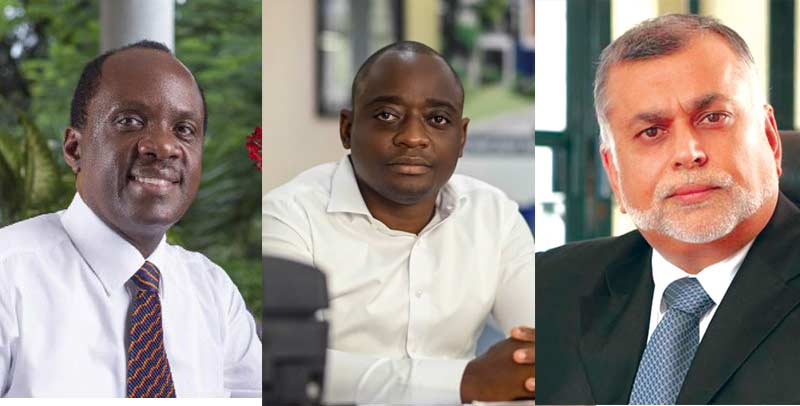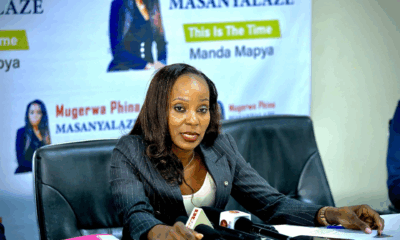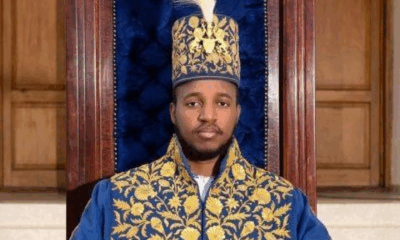News
Amin used the Dream to chase Asians, M7 is using conspiracy of silence
Serious governments pay a great deal of attention to the laws governing business related transactions.
They do so since no country can earn meaningful development without a flourishing business atmosphere.
How government makes and implements laws to do with business, would act as a good measure of it’s growth or lack of it.
No serious businessperson would want to work in a country where the laws are unjust and unfair or are applied selectively.
How faster or sluggish the courts of any country tend to resolve business disputes, would go a long way in facilitating business growth and vice versa.
Where corruption thrives, honest business people wouldn’t dare step.
Only the corrupt investors would thrive in such a kind of atmosphere.
Where the land office is a den of land forgeries, honest businesses would go into hiding.
If banks and money lenders are allowed to determine what interest to charge.
And to unfairly hound borrowers, such business environment would collapse businesses or force them into flight.
If am not mistaken, our own government would struggle to pass the litmus test when gauged by the foregoing standards.
Ferroz and Ekemu
More than two decades ago, Ferroz Kassam hurriedly packed up his bags and angrily left Uganda.
Ferroz was leaving Uganda in protest for neighbouring Tanzania.
Here is what pissed Ferroz.
The Attorney General( AG) of the day, Joseph Ekemu took a seemingly unfair decision . Ekemu did so on a Saturday which is clearly a public holiday.
That decision saw Ferroz losing Speke hotel to Sudhir Ruparelia. The matter had been under court contestation for some years.
For that matter, Ferroz had placed a caveat on the facility to stop crooks from altering it’s ownership.
The removal of the caveat helped Sudhir to hurriedly alter the hotel to himself. And as they say, the rest is history.
What Ekemu did angered Ferroz beyond measure. Subsequently , the aggrieved Asian tycoon left for Tanzania.
Whereas he left behind buildings, such as Kob House located adjacent to Equatorial Hotel, Ferroz took along with him, his other investments plus money on the way to Tanzania.
The above living example would serve to demonstrate the fact that bad laws could prove financially tragic.
Yet the government of Uganda never bothered at all to take action against it’s blundering Attorney General nor Sudhir.
Had the authorities taken action against the Attorney General and Sudhir, such action would have served as a deterrent measure against prospective culprits.
There is another classic case which can also ably demonstrate how bad laws can affect business in any country.
Bitature
The case involves businessman, Patrick Bitature. The hitherto Mr. Clean entrepreneur is currently mired in dirt.
The much-sought-after motivational speaker, whose byword is honesty, is himself ironically mired in dishonesty.
Bitature borrowed a total of Ten million United States dollars from South African venture capital fund Vantage Mezzanine Fund II in 2014. The Simba Group honcho was obliged to return the funds in 2017.
Five years down the road, Bitature has never paid a single cent to the people who helped him at his direst hour.
In any case, his lawyers led by Fred Muwema, have since moved Justice Musa Ssekaana to declare the debt invalid.
The lenders rejected the ruling. They went ahead and advertised Bitature’s estate for auction.
But they would again shoot themselves in the foot by appealing the ruling. This essentially means, they had accepted to maintain the status quo, as per Ssekaana’s ruling, pending resolution of the appeal.
Confusion
As we were still at it, Justice Stephen Mubiru resurrected the case by directing for Bitature’s prosecution and this time, before a Magistrate’s court.
In effect, Mubiru’s verdict tended to overrule the one of Ssekaana. Never mind the fact that they are all high court judges!
Before the two rulings were delivered, Justice Boniface Wamala had referred the case to arbitration in London.
You can figure out the hotch-potch judging from the three verdicts.
In hindsight, you can forgive Bitature for playing with the laws. The man is in deep trouble of losing his lifetime empire.
Dejected, he is expected naturally to do anything including exploiting the gaps within the law, to save his empire.
After all, Bitature doesn’t make laws. His job is simply to exploit the gaps in those laws, in order to escape to safety.
The unbecoming conduct of the lenders can be excused in the context of this case.
They have been waiting for five years for payment from Bitature only for court to declare their claim as invalid.
The same goes for Muwema. He is just a sharp lawyer out to rescue his client and his investments.
That’s what he was exactly taught to do at the Law school. That’s how he earns bread and butter for himself and the family.
Even Justice Ssekaana is, to an extent, an innocent man. He doesn’t make laws. His job is to enforce the laws the way there.
When it comes to matters to do with bad laws, the buck starts and stops at the door of the government, Parliament and the Uganda Law Review Commission.
Yet, while Bitature is tossing the people who bailed him out, by using the law to cheat them, neither has the government, Parliament nor the Uganda Review Commission, seemed bothered by what is afoot!
Bitature aside, there are two other living cases which can ably demonstrate the tragedy of the laxity of the law and the crime of omission on the part of government, when it comes to dealing with loan defaulters and resolving business disputes.
Hamis Kiggundu
The first one involves Hamis Kiggundu. Ham, as he is popularly known among his peers, sued and won a controversial lawsuit against Diamond Trust Bankv(DTB).
Justice Henry Adonyo ruled that since Ham had asked for loans from DTB Uganda, but DTB Kenya issued the loans instead, this invalidated the loans.
DTB Kenya isn’t licensed to operate in Uganda. So, Adonyo penalized the bank by telling them to treat the loans as a loss.
Muwema, who moved Justice Ssekaana to declare Bitature’s loans invalid, is the same lawyer who moved Justice Adonyo, to declare Ham’s debts invalid.
Ham hadn’t totally denied taking the debts. His only case was that DTB had fraudulently taken the money off both his Ugandan and United States dollars accounts. He asserted that what DTB picked from the accounts was way above and even beyond what he was supposed to pay.
Since the judge didn’t subject Ham’s assertions to strict proof, he didn’t help the country to know if the businessman was telling the truth or not.
The judge also denied DTB an opportunity to rebut the assertions during the full hearing which never was.
Sudhir Ruparelia
The third case is one of Sudhir Ruparelia and Bank of Uganda. This too was a funny case.
Sudhir admitted causing Crane Bank a total loss of UGX88bn. He put this in writing.
That notwithstanding, the tycoon turned around and stated, among others, that Bank of Uganda invalidated his own confession by leaking it to the public!
The judges excused him from refunding the loot and instead directed Bank of Uganda to compensate him!
The laws Sudhir used to escape justice are still in place waiting for another person to do the same and dodge giving accountability for his illegal dealings.
The government, Parliament and Uganda Law Reform Commission, on the other hand, are deeply slumbering on the job!
Comments



























